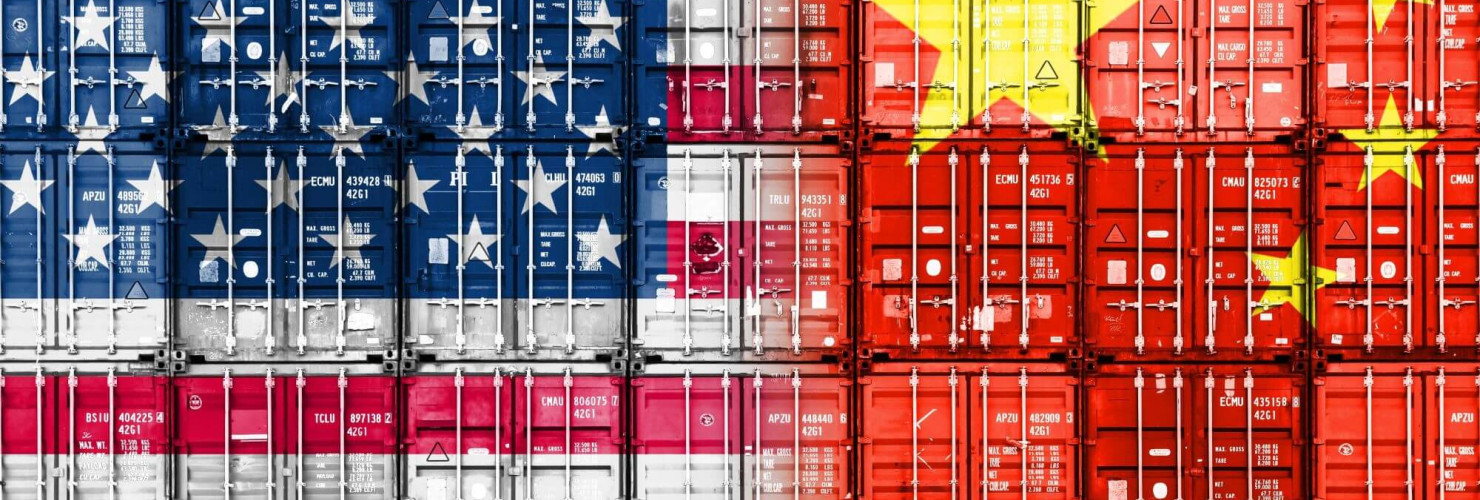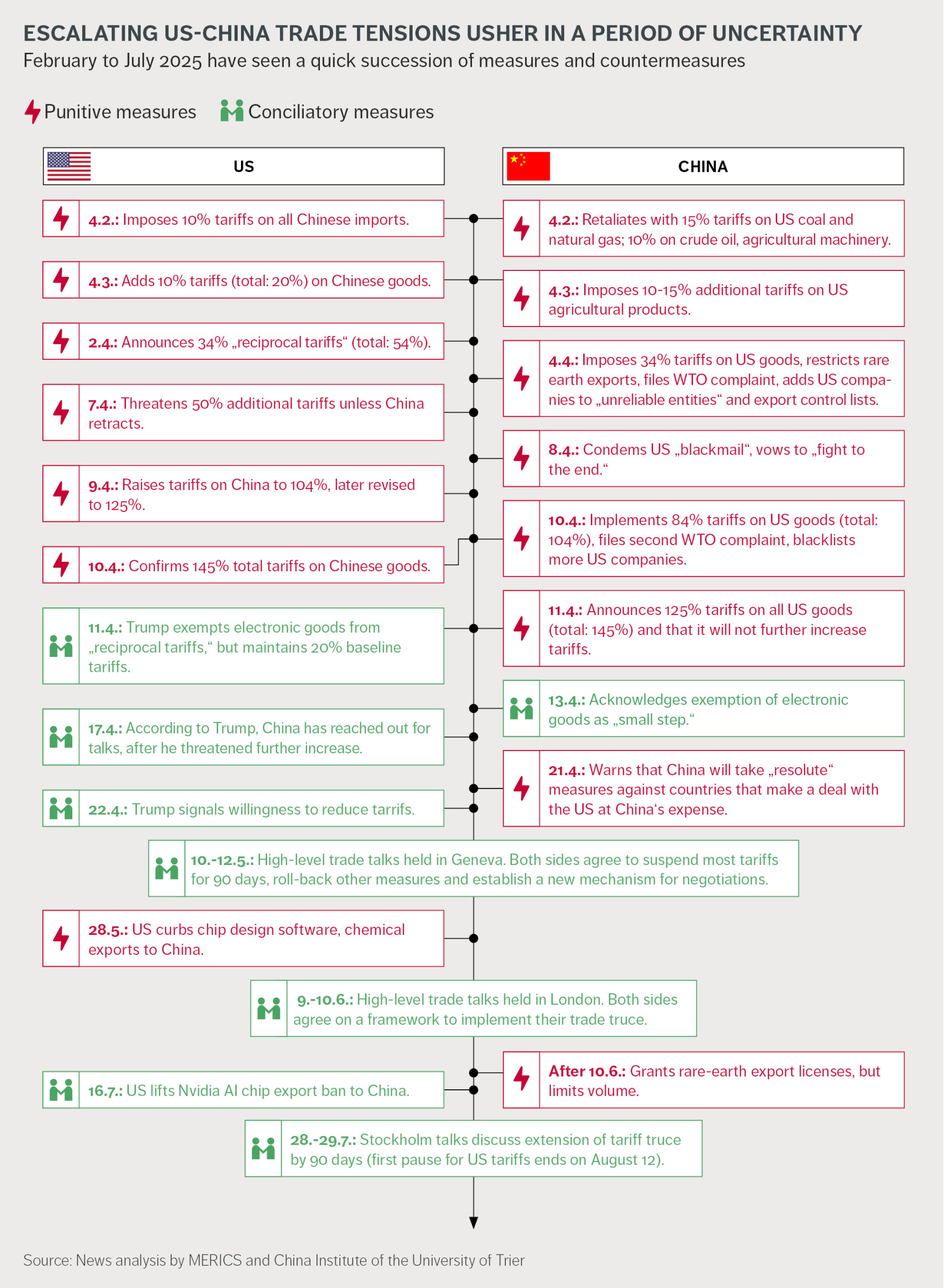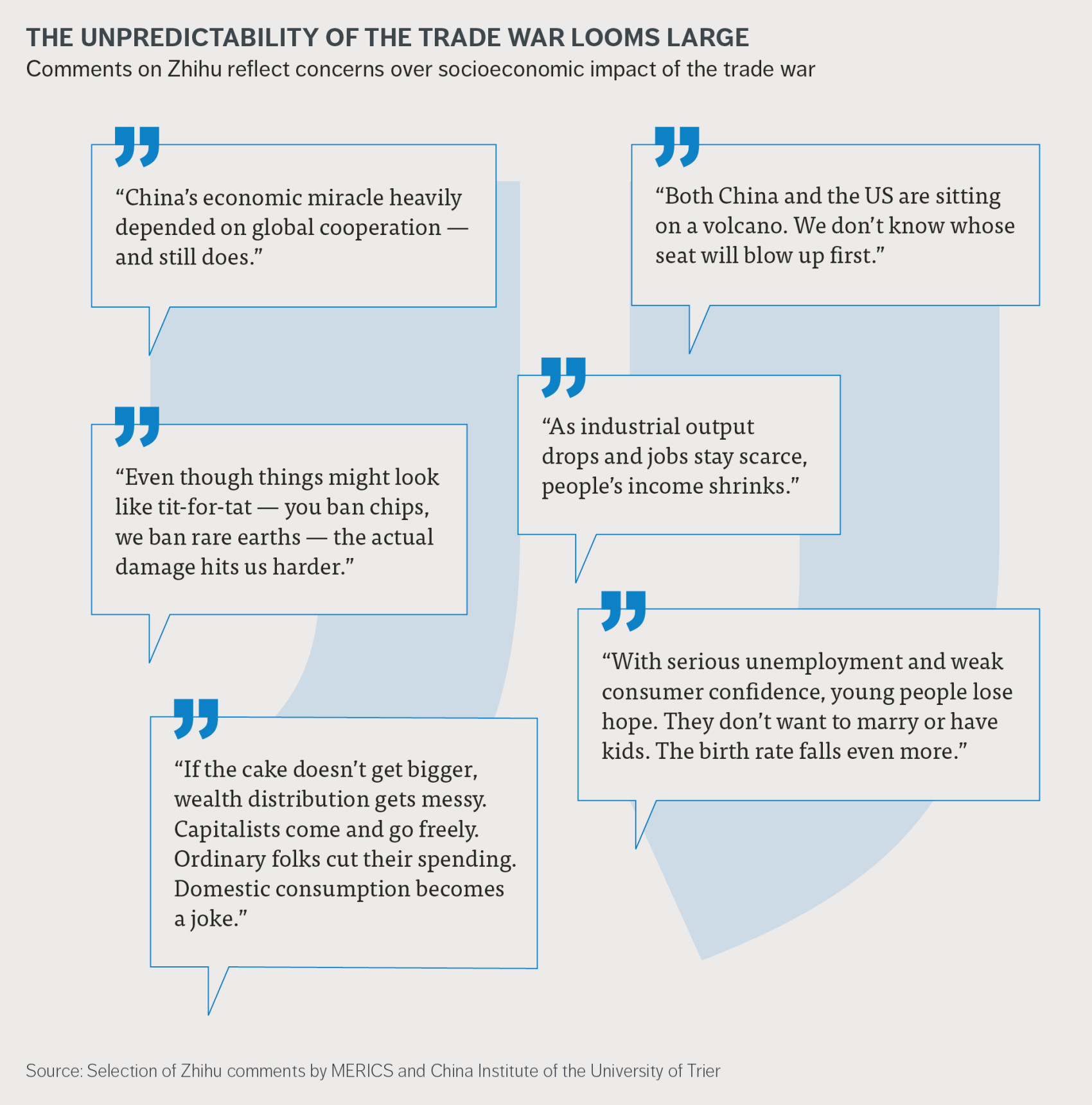

The end of globalization as we know it: How Chinese experts and netizens debate the US-China trade war
 This analysis is part of China Spektrum, a joint research project with the China Institute of the University of Trier (CIUT) funded by the Friedrich Naumann Foundation. As part of this project, we analyze expert and public debates in China. Learn more about the project and find previous publications here.
This analysis is part of China Spektrum, a joint research project with the China Institute of the University of Trier (CIUT) funded by the Friedrich Naumann Foundation. As part of this project, we analyze expert and public debates in China. Learn more about the project and find previous publications here.
Summary
- China and the US remain interlocked in a trade war. Beijing has stood its ground and signals confidence. But domestic debates reveal substantial concerns over the conflict’s impact, indicating that international observers should treat boasts about the strength of China’s economy with caution.
- Chinese international relations experts and economists have weighed in to discuss the trade tensions and their implications. Most share the view that a fundamental change is underway in the global trade regime and that the escalating trade conflict symbolizes a turn away from free trade and globalization.
- They acknowledge that China remains reliant on exports and therefore needs to diversify and expand market access abroad. China should reorient its trade relations towards the Global South, being careful not to trigger trade barriers.
- Importantly, experts maintain that China’s long-term economic resilience requires reforms at home. This includes tackling overcapacity and boosting domestic consumption by stabilizing employment and raising incomes.
- Online, citizens poked fun at US policies, especially the Trump administration’s efforts to bring factory labor back to the US. Recalling historical grievances towards the US and West, netizens called for “patriotic consumption”. But online debates also reflect anxiety over jobs and livelihood.
China and the US remain interlocked in a fierce trade conflict. Starting from February 2025, the rapid crossfire included staggering tariffs and a host of measures and countermeasures (see timeline). High-level talks in May, June and Juli in Geneva, London and Stockholm brought a temporary ceasefire. Both countries have resumed exports of key products. But a baseline of new tariffs is set to stay in place, and each side keeps accusing the other of undermining the precarious truce.
Amid volatile bilateral relations, China has stood its ground and signals strength. In a Chinese government white paper promoted under the tagline “Trade wars produce no winners”, the US is harshly criticized as a “bully” that relies on protectionism and economic coercion to advance its interests. China’s leadership and representatives from various ministries jumped on the opportunity to present the country as a stabilizing force in the global economy. The key message: China is open to dialogue and cooperation, but ready to defend itself.
Experts debate new trade realities and necessary responses
Chinese international relations experts and economists have weighed in on the growing trade tensions and their impact. Reflecting the severity of the situation, Chinese observers, too, regularly refer to the conflict as the tariff war (关税战), trade war (贸易争/贸易战) or conflict between China and the US (中美冲突). In recent months, numerous articles published by academic institutions, in magazines and on social media discuss current geoeconomic dynamics and offer diverse perspectives on necessary policy responses.1
Tariffs accelerate a fundamental reset of the global trade order
Experts agree that the escalating trade conflict has far-reaching implications. Assessments differ on whether current US policy marks a fundamental shift away from free trade. But many see it as a struggle over who will define the rules of the new trade order.
„Trump is known to bully the weak and fear the strong,” says Jin Canrong (金灿荣), Vice Dean of the School of International Studies at Renmin University. But the US president would not be easily swayed from his path, auguring a period of hardship for China’s economy. Jin believes that the intensity of the ongoing trade war will far exceed that of the previous round, effectively marking the end of free trade.
To Zhang Chunlin(张春霖), former Chief Expert on Private Sector Development at the World Bank, the US’ withdrawal from the current trade order will lead to difficult adjustments, but free trade will continue in a multipolar world economy. Nonetheless, he sees two risks: that current international trade rules are replaced by American rules and that US market restrictions will trigger tariffs and other barriers between countries due to a large-scale oversupply in the global market.
Only a few articulate underlying reasons for the intensifying friction more explicitly. Sun Liping, a retired Tsinghua professor, discusses China’s role in global overcapacity. For him, a quick end of the tariff war is unlikely. He views current developments in the context of a “big dismantling” (“大拆解”), where the established division of labor between the US (innovation), Japan and Germany (high-end manufacturing), China (low-end manufacturing) is reset, signifying the end of globalization as we know it.
China should focus on expanding international opportunities
As technological competition, national security concerns and political ideology override economic considerations in China-US relations, China needs to brace for long and severe trade tensions. Most experts share the view that diversification of markets and outward investment is key to safeguard China’s national interests.
Lu Feng (卢锋), Professor and Director of the China Macroeconomic Research Center at Beijing University, argues that China prepared itself well under Trump’s first term by strengthening self-reliance. This time, China should respond by opposing US-driven decoupling and joining forces with BRICS members, developing countries and Western states where possible.
Su Qingyi (苏庆义), researcher at the Institute of World Economics and Politics at the Chinese Academy of Social Sciences (CASS), points out that reducing dependence on the US market and deepening trade ties with Global South countries is key. This requires differentiated strategies and government support for enterprises entering emerging markets.
Luo Zhiheng (罗志恒), Chief Economist and President of Yuekai Securities’ Research Institute, and co-authors recommend that China should take the lead in establishing new trade frameworks by reducing or removing tariffs (except on US imports) as a sign of goodwill. Additionally, they call for a diversification of China’s export destinations. China should avoid significant disruptions of national markets that could trigger backlash. Instead, “China must strive to replace the US as the world’s biggest buyer.”
The trade war highlights much-needed domestic reforms
Experts have reiterated their long-standing calls for domestic reforms, emphasizing that these will be crucial to mitigate the trade war’s effects and secure China’s long-term growth. While many voiced their support for official policies of self-reliance and home-grown innovation, numerous experts called for tackling overcapacity and boosting domestic consumption.
The trade war provides a strong impetus for China's economic rebalancing, says Wan Guanghua (万广华), Vice President of the Institute of Chinese Modernization and Development at Nankai University. In addition to boosting innovation, this means reducing ineffective government investment, especially in industries with overcapacity, say Wan and colleagues. To increase consumption, China needs to raise household income through tax reforms, subsidies and better social security, focusing on low-income groups and less developed regions.
Lu Feng (卢锋), Professor and Director of the China Macroeconomic Research Center at Beijing University, echoes these assessments. He notes that China has many favorable conditions for coping with the crisis but needs to address internal challenges. He calls for institutional reforms such as improving rule of law, adjusting the household registration system and agricultural land use, as well as improving social security and public services.
Sun Liping stresses that people’s livelihood should not be an afterthought after the national economy. Instead of focusing on modern, largely automated high-end manufacturing, he urges the government to promote small and medium-sized enterprises and the service industry, which provide most employment opportunities.
Online discussions showcase public concerns over a downward spiral
The trade conflict and its economic implications have also spurred debates online, with Quora-like Zhihu dedicating a special section to the topic. In April, a People’s Daily article titled “The Sky Is Not Falling” was published to reassure citizens. Instead, it triggered substantial criticism for being unrealistic, some of which was swiftly censored. Meanwhile, content mocking US policy choices or touting China’s strengths were boosted by official outlets, exemplifying government attempts to steer debates.
Satire and “Schadenfreude” apparent in online memes
The Trump administration’s broader goal to reshore manufacturing drew immediate ridicule. Memes poked fun at the Trump administration’s simplistic vision for reindustrializing the US, with some showing Trump, Vance and Musk at the assembly line. Viral AI-generated videos and images portraying the imagined misery of American workers underscore lived experiences that still shape views on factory labor.
Online posts and memes also took aim at Trump’s apparent miscalculations. One Weibo post used a Texas Hold'em poker analogy to drive home the point that Trump was overconfident and reckless, but that his “bluff” ultimately failed in light of China’s strong, calculated countermeasures.
Netizens recall history of containment and call for patriotic consumption
Users frame current frictions as part of a history of US containment, alerting others to the US-led trade embargo against China between 1950 to 1973, and the trade restrictions on Chinese textiles in the 1990s. Compared to then, China is now in a position of economic might and has relatively ample resources to weather the storm, commentators suggest.
On Zhihu as well as other platforms, comments echo official historical narratives around China’s century of humiliation and continued struggle against the West. Calls for patriotic consumption to strengthen the domestic economy reverberated across platforms.
Underneath, anxiety over jobs and livelihood lingers
But Zhihu debates also reflect substantial anxiety about the economic and labor market situation. Mirroring concerns raised by economists, some commentators doubt that China will be able to offload its production capacity abroad. The potential fallout could include high unemployment, rising inequality, and even risks for social stability and China’s demographic development, users note.
A pivotal moment in global trade
The government’s official message has been one of confidence and strength. But domestic debates reveal substantial underlying concerns over the trade war’s impact. Notably, experts – many of them economists – argue that sustainable growth requires a rebalancing of China’s economic model, indicating that international observers should treat boasts about the strength of China’s economy with caution. Reforms may boost domestic consumption in the long run, but won’t happen overnight.
Experts and the general public see increasing hostility and friction with the US as irreversible in the foreseeable future. While concerns for livelihood are apparent in citizen’s comments, so is public support for a national “struggle” as patriotic campaigns seem to pay off. In addition to the tit-for-tat over tariffs, a potential US ban on TikTok and restrictions on Chinese students in the US are bound to further fan political tensions and public debates around unfair treat of Chinese companies and citizens by the US.
Faced with geopolitical headwinds, China has shown its resolve to stand its ground and leverage dependencies (such as on rare earth) to advance its interests. But expert assessments reflect that the country remains reliant on global trade. In the EU and beyond, stakeholders should pay close attention to how China seeks to maintain and expand access to markets abroad, be it through pressure – as in trade negotiations with the EU – or through incentives, exemplified by the elimination of tariffs for 53 African countries in mid-June. One thing is certain and reflected in some of the expert debates: China wants to be at the forefront of defining the next chapter of globalization.
- Endnotes
1 | For this analysis, the authors reviewed 16 articles by Chinese experts published from April to June 2025 on the academic online debate platform “Aisixiang”, on publicly available WeChat accounts and in “China reform” (Caixin mediagroup) on the trade conflict. The comprehensive expert analysis on the “Sinification”-Blog was another valuable source. Additionally, commentaries on the Q&A-platform Zhihu were analysed. The selection was made to show a broad spectrum of opinions.
The authors would like to thank our former research intern Ariane Kolden for her contributions to this China Spektrum analysis.



